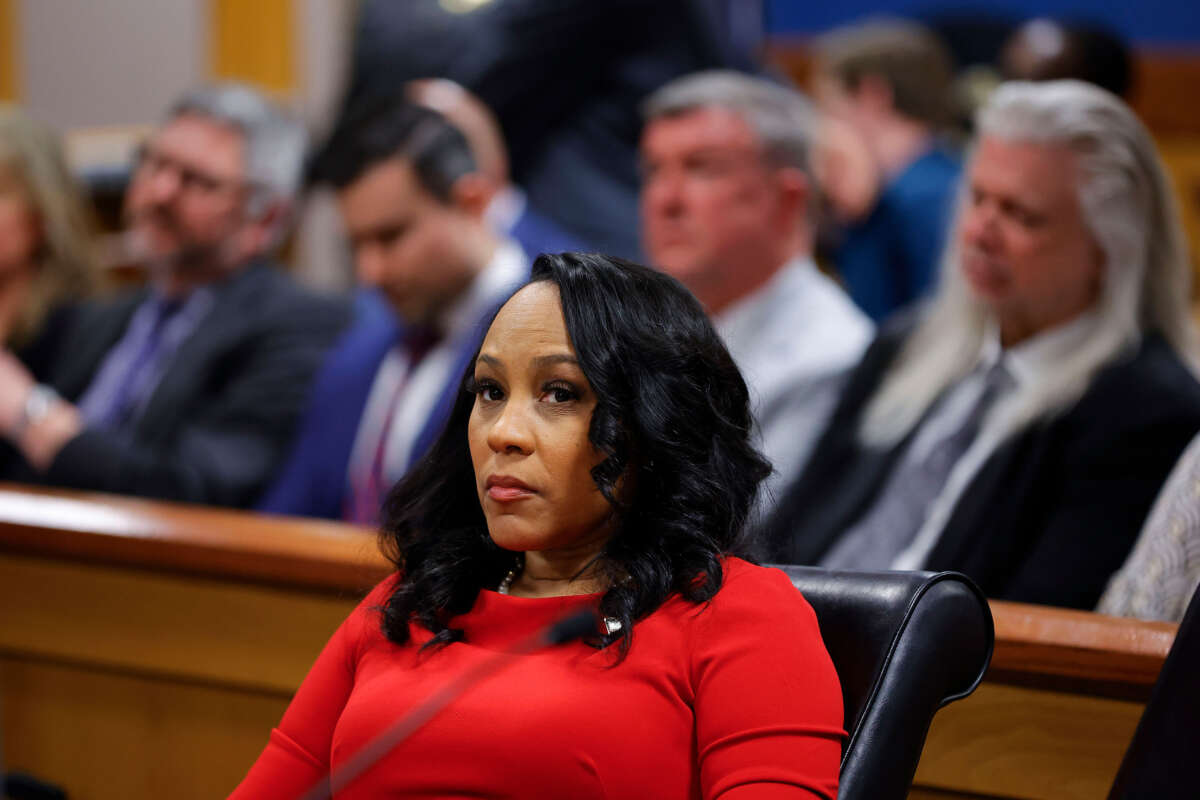Truthout is an indispensable resource for activists, movement leaders and workers everywhere. Please make this work possible with a quick donation.
The Georgia Court of Appeals has set a tentative court date to hear a challenge to an earlier lower court ruling in March allowing Fulton County District Attorney Fani Willis to remain on a case regarding attempts by Donald Trump and his allies to overturn the 2020 presidential election.
The new timeline will likely delay any trial date for the former president and GOP presidential nominee until well after the election this fall.
Willis has charged Trump and a number of his cohorts with dozens of indictment charges, alleging that his pressuring of a state elections official and his campaign’s arrangement for fake electors to illegally take part in the certification of the Electoral College after President Joe Biden’s win in Georgia was brazen election interference.
Seeking to delay the trial as much as possible, Trump and eight of his co-defendants alleged that Willis and a person working in her office, special prosecutor Nathan Wade, had an improper relationship that amounted to a financial conflict of interest. Superior Court Judge Scott McAfee, who presided over hearings regarding that complaint, rejected both the dismissal of the indictment and the demand that Willis be removed, although he did stipulate that either Willis or Wade had to remove themselves from the case. Shortly after, Wade announced he was leaving the case.
McAfee left open the possibility for Trump and his allies to appeal his decision, which they ended up doing. On Monday, the Georgia Court of Appeals announced the tentative date of October 4 to hear oral arguments in that appeal.
Both sides will provide a three-judge panel with legal briefs regarding the appeal within the coming weeks. Technically, the judges do not have to hold the hearing at all — after examining the arguments in the briefs, they could decide on the matter at that moment. But the appeal process seems likely to reduce the possibility that the trial against Trump could start anytime this year.
If the October 4 hearing happens, the judges will have until March to rule on the matter. Even if they decide not to hold the hearing, their decision doesn’t have to be made anytime soon — and no matter what they decide, their ruling will likely be appealed by the losing party to the state Supreme Court, which will inevitably delay the trial even further.
Legal experts have long viewed the Georgia case against Trump to be a compelling criminal case that could potentially lead to a guilty verdict. The delays — and the possibility that Trump could win the presidency again later this fall — have greatly reduced the likelihood that the case will be heard anytime soon, or at all.
Last week, a New York-based trial concluded with a guilty verdict against Trump. That trial related to allegations of Trump paying hush money payments to women he had extramarital affairs with, and concealing those payments through improper business tactics in violation of state law. Polling has demonstrated that the guilty verdict could slightly lower Trump’s chances of defeating incumbent President Joe Biden in the November election.
Trump has vowed to appeal that court’s decision and has demanded that the U.S. Supreme Court intervene in the case to overturn his 34 felony level guilty verdicts. A sentencing decision is set to occur on July 11. Trump could face a prison sentence, though it is more likely he will be faced with fines or other non-incarceratory punishment.
A terrifying moment. We appeal for your support.
In the last weeks, we have witnessed an authoritarian assault on communities in Minnesota and across the nation.
The need for truthful, grassroots reporting is urgent at this cataclysmic historical moment. Yet, Trump-aligned billionaires and other allies have taken over many legacy media outlets — the culmination of a decades-long campaign to place control of the narrative into the hands of the political right.
We refuse to let Trump’s blatant propaganda machine go unchecked. Untethered to corporate ownership or advertisers, Truthout remains fearless in our reporting and our determination to use journalism as a tool for justice.
But we need your help just to fund our basic expenses. Over 80 percent of Truthout’s funding comes from small individual donations from our community of readers, and over a third of our total budget is supported by recurring monthly donors.
Truthout has launched a fundraiser to add 460 new monthly donors in the next 8 days. Whether you can make a small monthly donation or a larger one-time gift, Truthout only works with your support.
